Our third Relational Councils Convening took place on 25th April 2022, co-hosted by LBBD. Bryony Shannon, author of the excellent blog Rewriting Social Care and Strategic Lead for Practice Development at Doncaster Council, shared her thoughts on why language matters, and how we can develop a more relational lexicon and, ultimately, more relational ways of working. A lively discussion then ensued, the key themes on which are summarised in this blog.
If you’ve been along to, or heard about, our Relational Councils Convenings, we’d love your thoughts on where next. Please take a moment to help shape the future of this work.
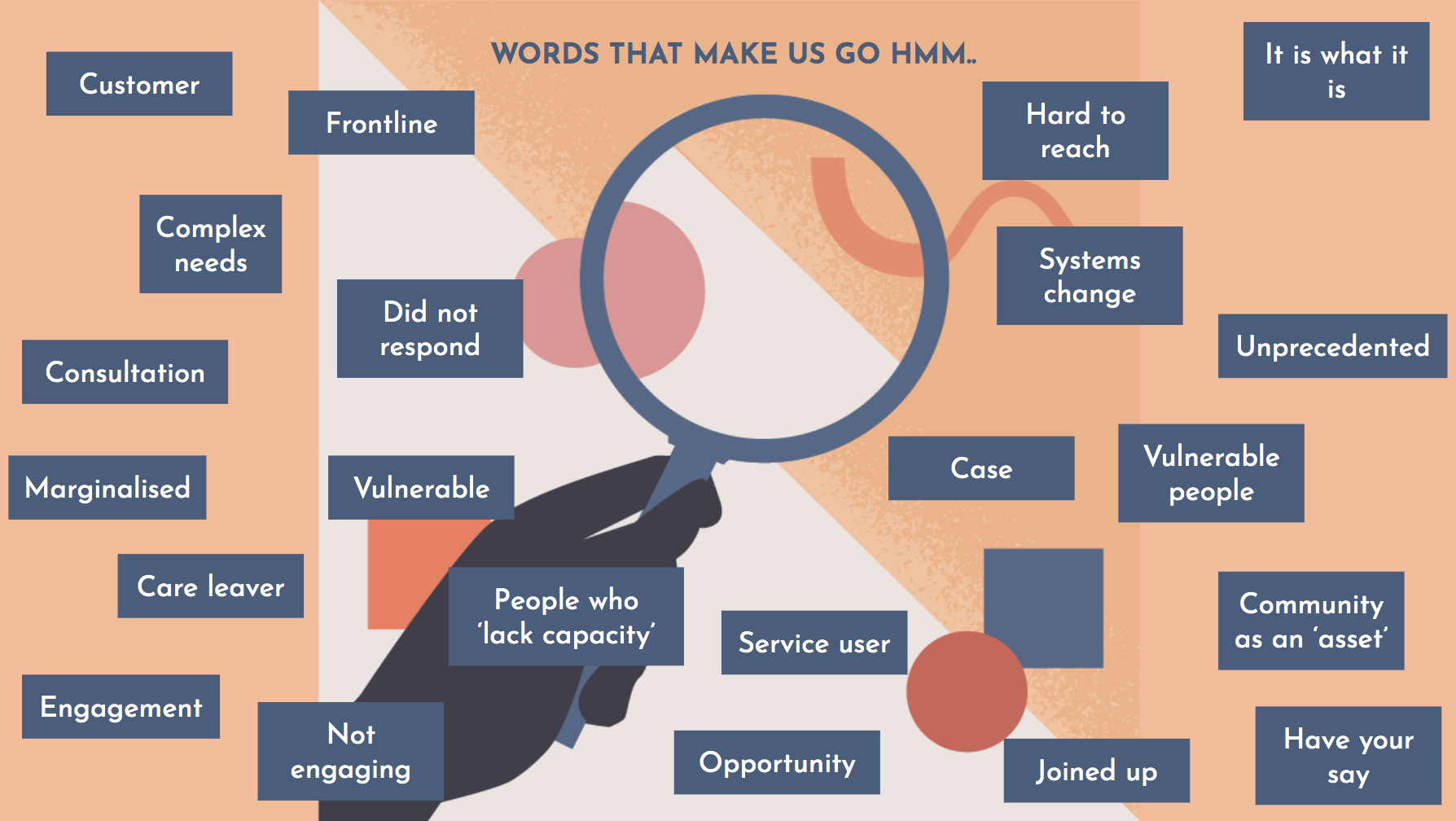
Why language matters
The words and phrases we use reflect our attitudes towards people. Too often our language shows an absence of kindness, of compassion, and even worse an absence of interest in what really matters, and what will really help
The language we use shapes our relationships
The language we use can act as a barrier, causing us to hold one another at arms length and leading to transactional relationships.
Language creates barriers between practitioners and people trying to help
Residents can feel isolated by the corporate language / terms we use to communicate with them
The language we use shapes our approach
The language that we use can invite or intimidate, connect or isolate. It can determine the success of efforts of co-creation, participation, consultation.
The language that we use is alien and intimidating to many people – it stops them from contributing and joining conversations
People felt nobody would want to hear from them, as the language we used and the language they used was not the same
Words cloud our judgement on what is happening. We need to be much more curious and ask why and what is happening to people. Focus on people being experts in their own lives
The language we use can shape how people see themselves
The language we use shapes how we see each other, and how we see ourselves. The labels that we’re given shape our identities, often in ways that we feel unable to influence. How we see ourselves and others ultimately shapes what we value, how we behave, and how we treat one another.
People pick up labels from the language we use, which can define them or even influence how they see their identity
The language professionals use can be very dis-empowering, eg ‘vulnerable’ label.. rather than ‘doing my best with what I have’
It is stigmatising. To describe a home as a ‘placement’ – what does this mean… It does not feel like a home (where you get care, nurture, sense of belonging)
Words that make us go ‘hmm’
In her blog, Bryony shares a host of words that make her go ‘hmm’ – strengths-based; vulnerable; frontline; those; care. We explored some of these in the session.
Us and them labels
In local authorities, we’ve developed a host of ‘us and them’ labels; words which divide, distance and exclude. In describing residents as ‘clients’, ‘customers’, ‘users’, ‘cases’ and ‘referrals’ we put distance between ‘us’ and ‘them’ – we dehumanise by using clinical labels that infer an arms length relationship.
Language conveys meaning – and in some instances conveys judgement so separates us in an unhealthy way
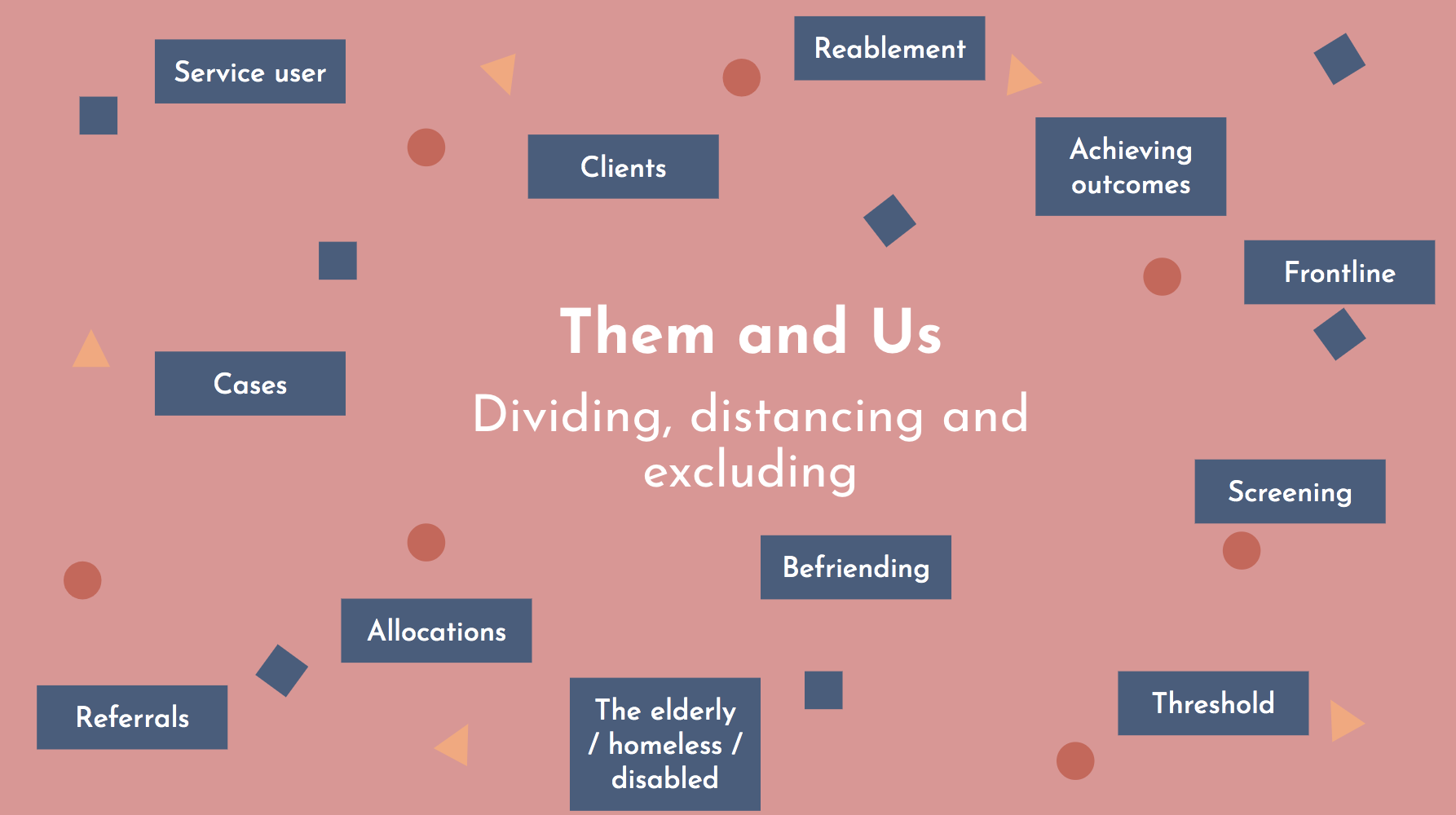
Blame words
We’re also guilty of using words which stigmatise and blame – which shift the focus away from the environment and circumstances that a person finds themselves in, onto the actions or behaviours that they exhibit.
We talk about ‘bed blockers’ rather than people who do not have adequate networks of support at home; we talk about ‘challenging behaviours’ rather than the experiences and circumstances that cause that behaviour; we talk about ‘hard to reach’ rather than the inherent biases and inequalities in the way in which our systems have been set up.
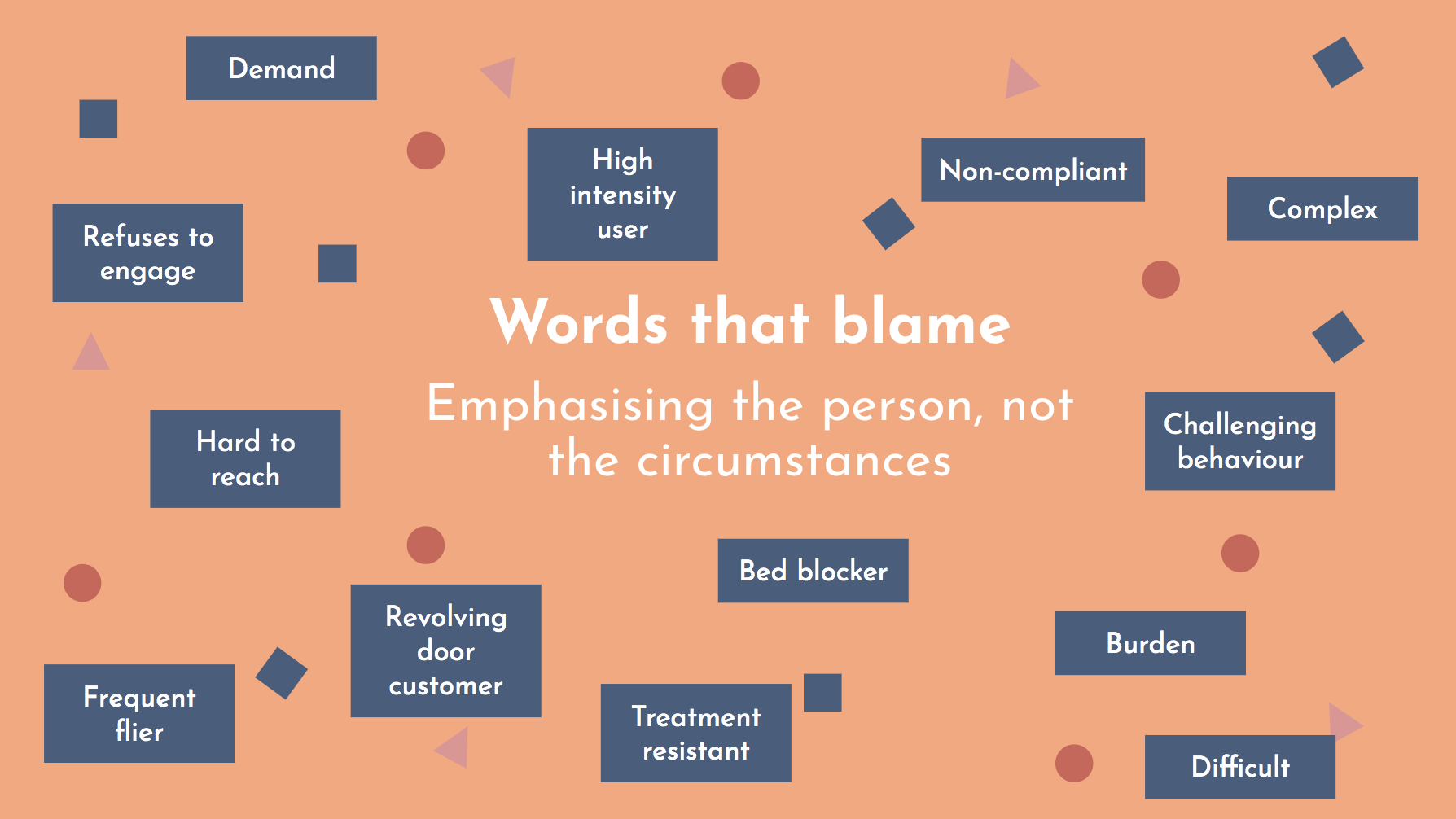
Process and transaction words
We’ve detached ourselves because we have no other option – the conveyor belt is moving too quickly for us to pause for long enough to form any sort of relationship where we can really understand people in the context of their lives, communicate using a method and at a pace that works for them, and explore a range of options together to enable them to get on better with their lives.
We’ve developed a language which focuses on process rather than relationships; which emphasises moving people through a system rather than developing and enabling relationships. We talk about ‘triaging’ ‘screening’ ‘signposting’ and ‘referring’ more than we do listening, understanding and empathising.
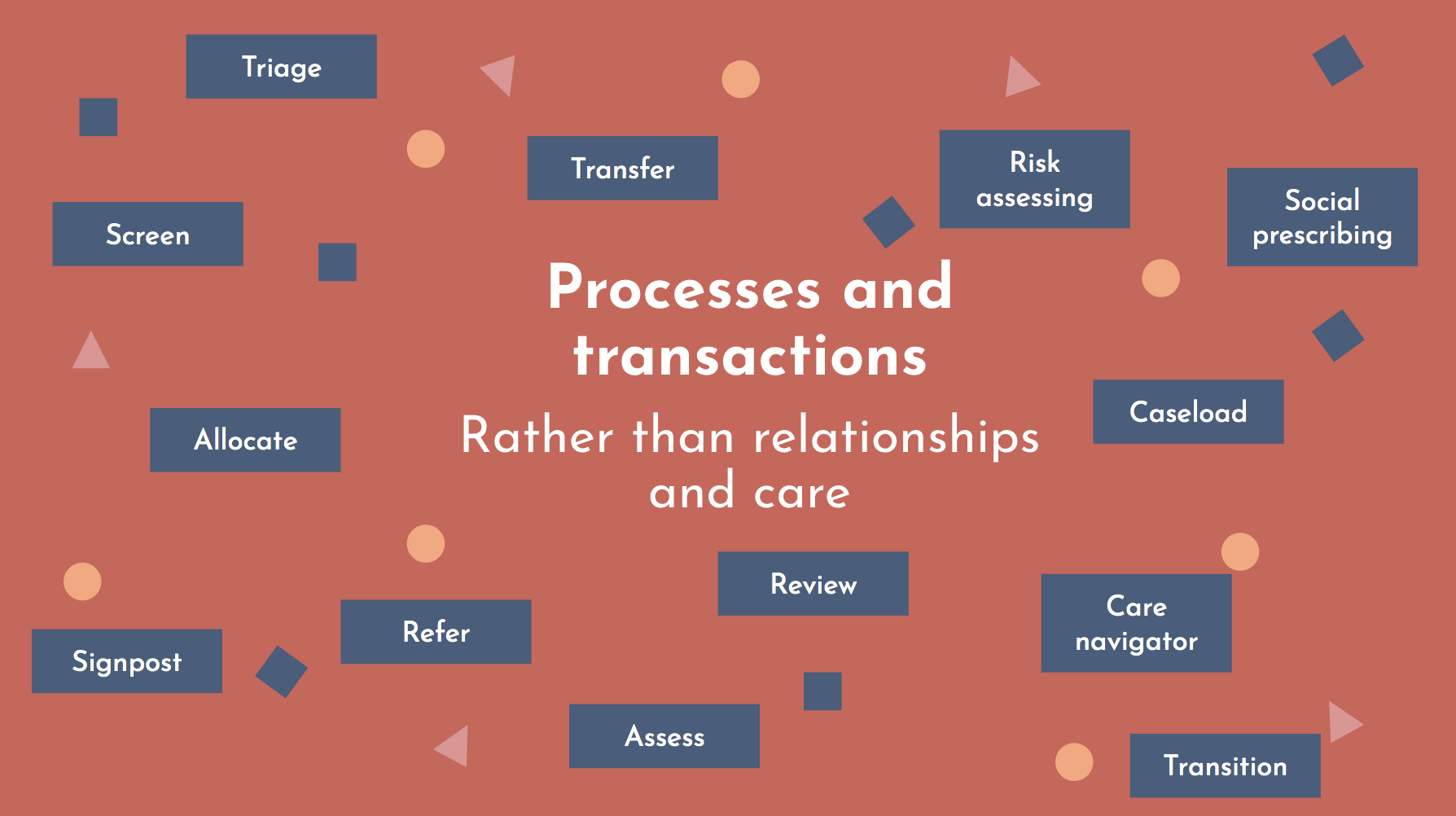
The things that have led us here
In the session, we explored the factors and influences that have shaped the language that we use – that have led us to a lexicon that often feels cold and transactional.
Power and diversity
We discussed the influence that power dynamics and lack of diversity have had on the language that tends to be used in local authorities, and identified glimmers of hope for a more democratically shaped lexicon on the horizon.
Power- lack of input from people perhaps means the language has developed as it has
Power dynamics and imbalance have led us to listen to the ones who hold the most power, so we’ll adopt their language
Diversity has improved in Local Gov over recent years.. but perhaps the previous lack of diversity has contributed to the language we have
Focus on process
In a previous Relational Council’s Convening, we explored how, oftentimes, the work of local authorities is led by processes, rather than relationships. This is then reflected in the language that we use.
Are these the ‘questions we need to ask’ to help the person or to demonstrate processes/ accountability?
How much of our work is to feed the process rather than help the person?
Professionalism
We also explored the pressure to present in a ‘professional’ manner has on the language that we use, reminding us of the deep-seated cultural influences that shape day to day language.
I’m often asked about professional boundaries – putting a boundary in place which segregates us from the people that we serve. Words and jargon are part of our professional identities – we don’t see everyday language as being professional. We need to address these boundaries in a way that enables us to grow more empathy. The language that we use can help us to dismantle these boundaries
Pressure and competition
We also explored the pressures to innovate, to compete, and to excel, and how we use language as a tactic to address those pressures when our practice might feel like it’s lagging behind.
[We use this language because] we want to look like we’re coming up with something new and shiny
Market competition. If you want to commission to the market you need to compare prices. To do that you need to specialise. This leads to specialised language and labels
We have chosen words [to describe] where we want to be, not where we are. Do we use language to hide truths and realities? To hide the realities of a minimum credible service?
Making the shift
The energy and commitment to shift both language and practice in a more relational direction is clear amongst the group that convened, and there was a shared recognition that shifting language alone will not suffice – the ways in which we work must follow suit.
Changing the language used within organisations and systems can often be a substitute for changing behaviour and beliefs, with the new softer-sounding language adding a coating of irony to unyielding bureaucracies
We’re pushing at an open door but changing language is not enough – behaviours and values need to change at the same pace
I am bothered by a kind of green wash…. people appropriating different language to make behaviour seem acceptable when, in fact nothing has really changed. We need to be sure to do both
Bryony shared some practical suggestions about how we can start to move the dial in both our language and the behaviours and practices that lie beneath. Rather than seeing this shift as a whole scale system change – which can feel overwhelming – we suggest searching for small opportunities to create more relational interactions and use more relational language which gradually embeds principles and conditions for wider scale change.
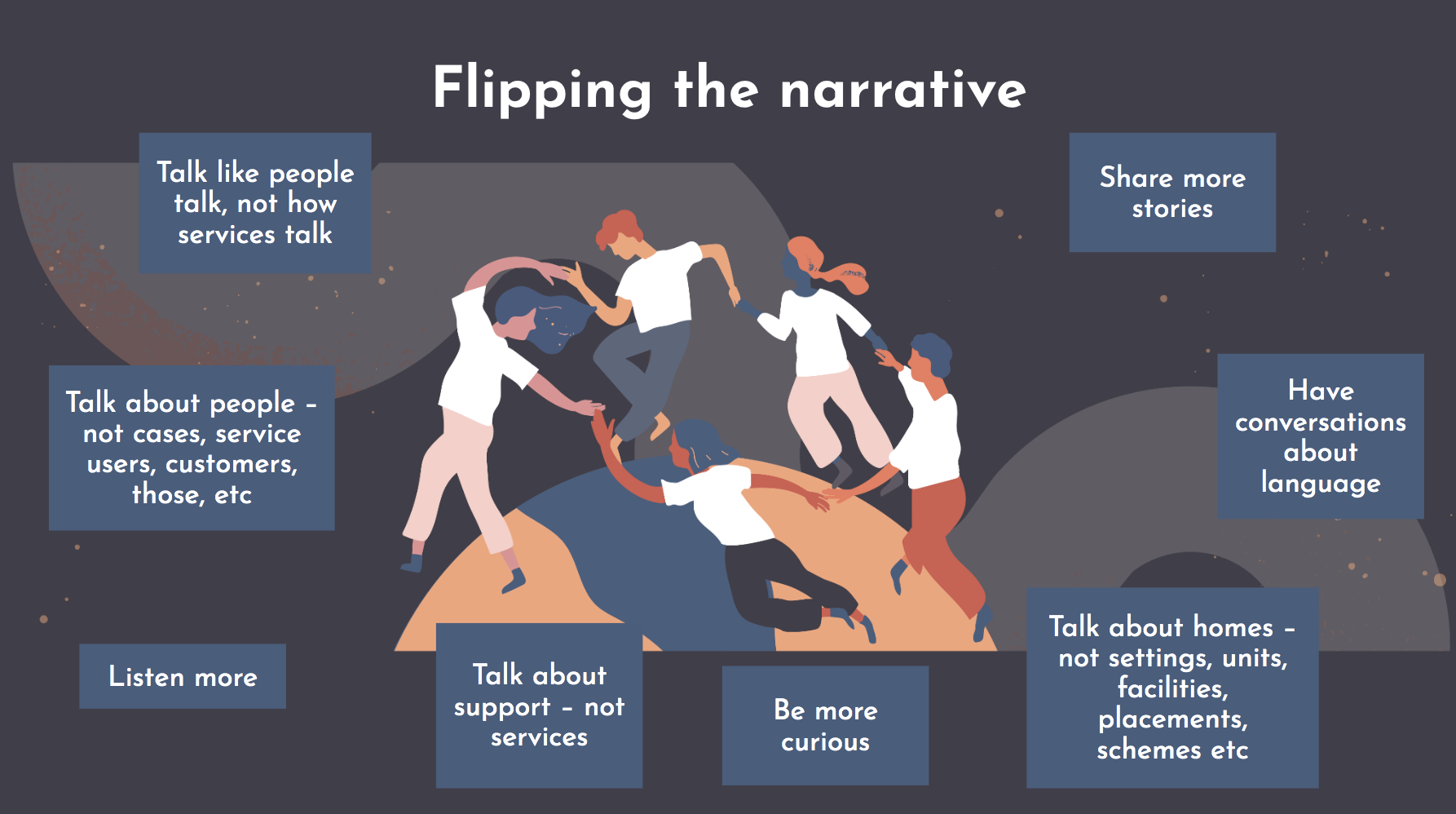
Moving Forwards
We have now hosted three Relational Councils Convenings and would value your guidance on where we go next. What topics would you like to explore? What can you bring to the group? What might we do together? Please let us know your thoughts.
